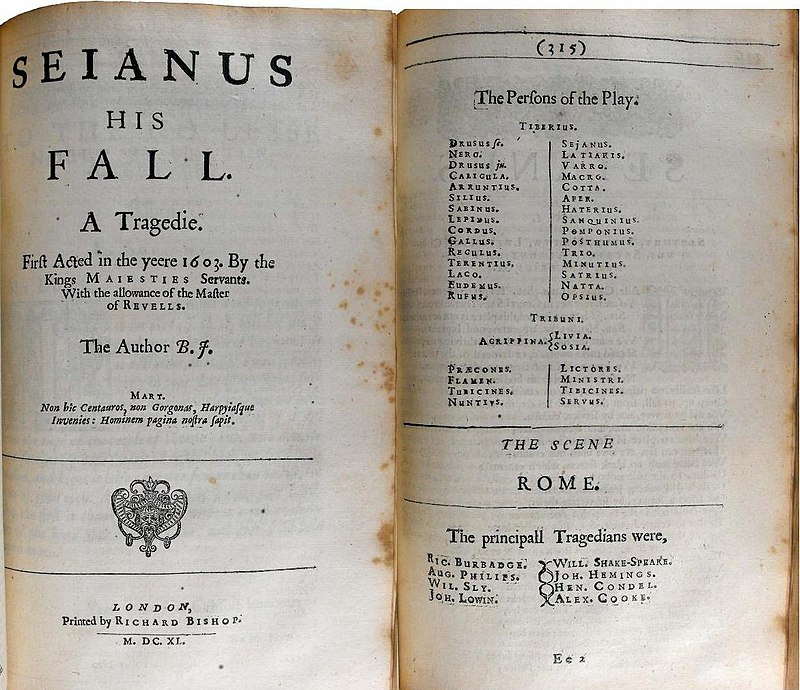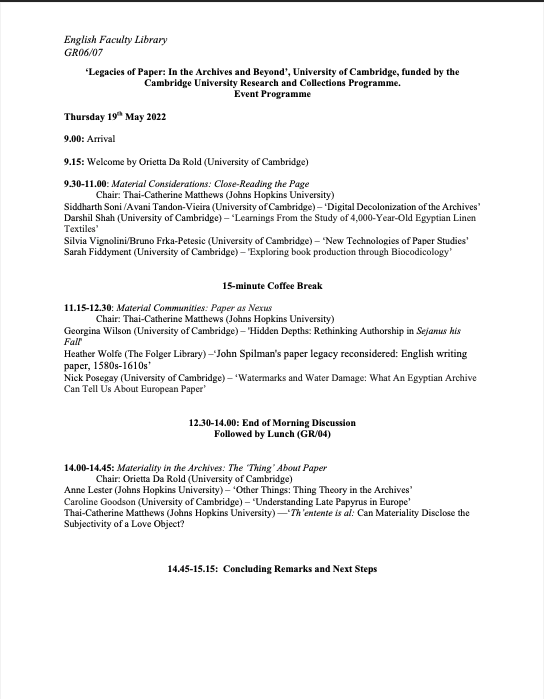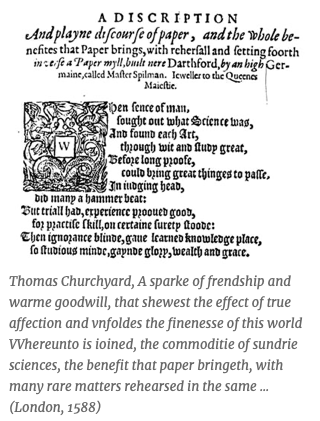Thinking Paper’s 2022 Lent Term Workshop
The Cambridge University Library’s Research and Collections Programme funds a number of incredible research projects: among them, the Thinking Paper project led by Dr. Orietta Da Rold (of the English Faculty) and Dr. Suzanne Paul (of the University Library). Thinking Paper refocuses attention on a medium that in Europe’s premodern era heralded a technological revolution: paper represents an important interdisciplinary conversation between literary scholars, historians of the book, economists, archivists, conservators, curators, artists, material scientists, surface chemists, bioarcheologists, and more. Understanding paper’s historical significance to these fields creates conversation that moves the materiality of the book not just to the forefront of scholarship, but to the center of research focused on the multivalence of a medium that continues to be essential to contemporary study—and life.
Generating cross-disciplinary conversations was the focus of 2022’s Lent Term Thinking Paper Workshop, entitled ‘Legacies of Paper: in the Archives and Beyond’. By ‘legacy’, we intended to think about paper as an influential medium across multiple contexts ranging from the scientific to the historical to the literary. To engage that conversation from multiple angles, we invited speakers from an array of expert backgrounds to articulate how paper figured in their research. The results were stunning: speakers generously gave papers on early modern economies and class-structures, the contemporary ethics of the archives, new readings of texts like Ben Jonson’s Sejanus His Fall, and much more.

Title page of the 1616 folio edition, with list of actors opposite.
Dr. Siddharth Soni and PhD Candidate Avani Tandon-Vieira, Dr. Darshil Shah, Dr. Bruno Frka-Petesic and Dr. Sarah Fiddyment united across science, literature, and the digital humanities to helm the morning session Material Considerations: Close-Reading the Page. Dr. Georgina Wilson, Dr. Heather Wolfe, and Dr. Nick Posegay all helmed the second session Material Communities: Paper as Nexus to give accounts of paper as an early-modern account of communities both economic and social while Egyptian archives were connected to early English papermaking and distribution. Our last session of the day, Materiality in the Archives: The ‘Thing’ About Paper, focused on materiality as a concept useful for producing new readings of canonical texts, an example of one such reading, and the material economies created by the transition from papyrus to paper from Dr. Anne Lester, Dr. Caroline Goodson, and Visiting Student to Cambridge, Thai-Catherine Matthews.
Take a look at the Workshop programme and our featured speakers’ papers here:

The Legacies of Paper workshop featured research across a variety of disciplines, fostering discussion about the legacy of paper in the archives and beyond. How does one decolonize archives by making materials gathered in one collection, in one place, available to all? What can ancient Egyptian practices around harvesting raw materials for linen teach us about climate-minded paper processing in the contemporary world? What is the relationship between the Genizah archive of Egypt and early European paper, and what can research about that connection teach us about early cultural diffusion?
These are just some examples of the questions prompted and discussed at June’s Thinking Paper workshop. Both as a visiting student to Cambridge and as one of the convenors of the workshop, I learned so much about understanding paper as a platform for multi-disciplinary discourse.
Paper is at the center of literary analyses, bio-codicology, archival research, ‘thing theory’ and materiality, economic exchange on papyrus, and more; its material value continues to be measured by the communities it creates, and the scholastic queries it fuels.
Can materiality disclose the subjectivity of a love object in Chaucer’s Troilus and Criseyde? Does publisher John Spilman’s ‘paper legacy’ reveal community-building to be one of paper’s ancient powers, bringing rag-collectors together with readers to produce new insights on the Early Modern economy?

Simon MacLeish, ‘Literary manuscripts 2010: finding Arcadia in the gutter,’ The Conveyor: News from the Bodleian Libraries Centre for the Study of the Book.
What if paper was a means of discussing the contemporary ethics of the archives, or generating new readings of canonical texts like Chaucer’s Troilus and Criseyde? This workshop represents the possibilities engendered by studying one medium from a multitude of disciplinary directions: the expertise of scientists, historians, activists, archivists, and literary theorists led to new questions about the evolving potential of an age-old medium.
With great thanks to Cambridge University Library’s Research and Collections Programme, this Workshop represents the culminating event of months spent researching and writing, planning and preparing, and capturing that progress here on The Manuscripts Lab blog.
Thai-Catherine Matthews, PhD Candidate, Visiting Student to the Faculty of English, University of Cambridge
